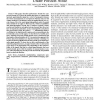Free Online Productivity Tools
i2Speak
i2Symbol
i2OCR
iTex2Img
iWeb2Print
iWeb2Shot
i2Type
iPdf2Split
iPdf2Merge
i2Bopomofo
i2Arabic
i2Style
i2Image
i2PDF
iLatex2Rtf
Sci2ools
109
click to vote
TSP
2010
2010
Compressed sensing performance bounds under Poisson noise
Abstract--This paper describes performance bounds for compressed sensing (CS) where the underlying sparse or compressible (sparsely approximable) signal is a vector of nonnegative intensities whose measurements are corrupted by Poisson noise. In this setting, standard CS techniques cannot be applied directly for several reasons. First, the usual signal-independent and/or bounded noise models do not apply to Poisson noise, which is nonadditive and signal-dependent. Second, the CS matrices typically considered are not feasible in real optical systems because they do not adhere to important constraints, such as nonnegativity and photon flux preservation. Third, the typical `2 0`1 minimization leads to overfitting in the high-intensity regions and oversmoothing in the low-intensity areas. In this paper, we describe how a feasible positivity- and flux-preserving sensing matrix can be constructed, and then analyze the performance of a CS reconstruction approach for Poisson data that minimize...
Artificial Intelligence | CS Reconstruction Approach | Negative Poisson Log | Poisson Noise | TSP 2010 |
Related Content
| Added | 22 May 2011 |
| Updated | 22 May 2011 |
| Type | Journal |
| Year | 2010 |
| Where | TSP |
| Authors | Maxim Raginsky, Rebecca Willett, Zachary T. Harmany, Roummel F. Marcia |
Comments (0)

